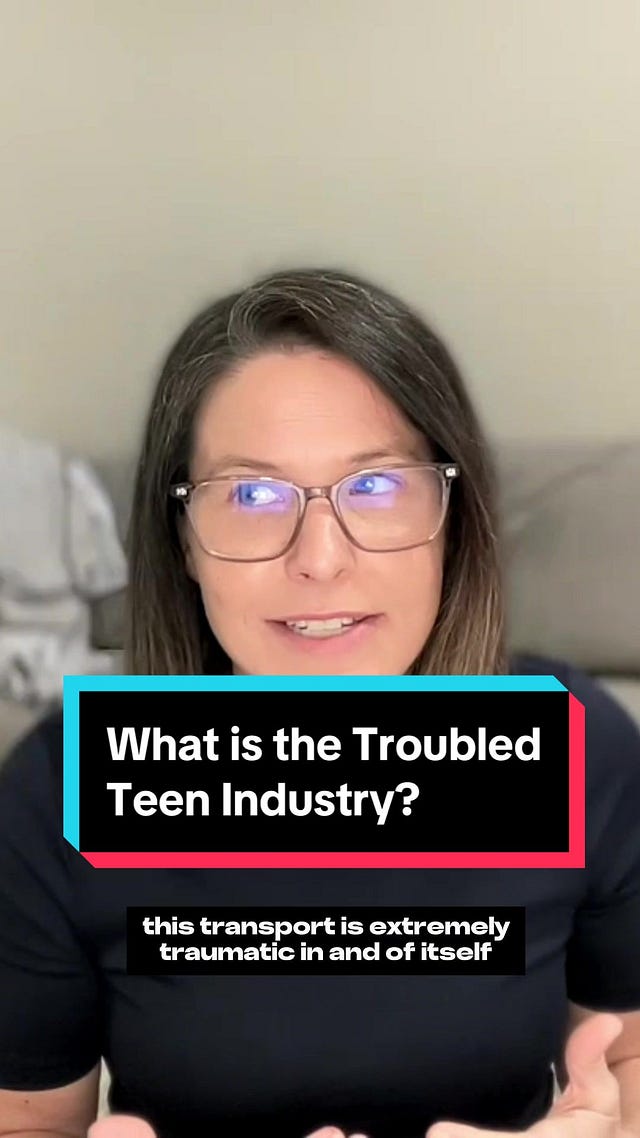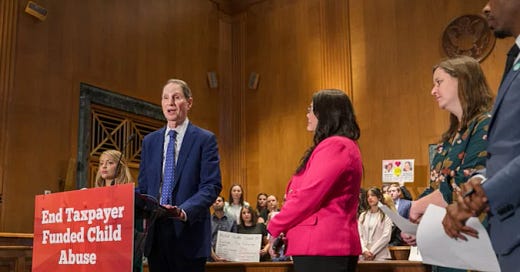The investigative report by the Senate Finance Committee, titled Warehouses of Neglect: How Taxpayers are Funding Systemic Abuse in Youth Residential Treatment Facilities, exposes the egregious conditions and systemic abuse within youth residential treatment facilities (RTFs). This detailed report, spearheaded by Senate Finance Committee Chairman Ron Wyden (D-OR), uncovers a troubling reality for some of our nation’s most vulnerable children and highlights in devastating detail the urgent need for comprehensive reform and accountability of what is often referred to as the “Troubled Teen Industry.”
According to the report’s findings:
In the best of circumstances, children at RTFs receive care from under-trained and overburdened staff, are given infrequent therapy, sometimes by non-professionals, and are exposed to unsanitary, unsafe, and non-homelike environments. In the worst of circumstances, children at RTFs suffer the above as well as sexual, physical, verbal, or emotional abuse at the hands of staff. Mistreatment is endemic to the conditions at RTFs.
At its core, the RTF model typically optimizes profit over the wellbeing and safety of children.
Unveiling the Report's Findings
The Senate Finance Committee’s two-year investigation, which was released at a Senate hearing on June 12, reveals a pervasive pattern of abuse, neglect, and mistreatment in RTFs across the United States. These facilities, which receive significant federal funding from Medicaid, the child welfare system, and private health insurance, are intended to provide specialized care for children with serious emotional and behavioral health disorders.
However, the reality is often far from this mission. The report highlights numerous instances of physical, sexual, and emotional abuse, harmful use of restraint and seclusion, and grossly inadequate behavioral health treatment.
Chairman Wyden emphasized the severity of these findings in his statement:
This investigation makes clear that taxpayers are funding child abuse in facilities that are supposed to help kids. These facilities, operating behind closed doors, too often provide nothing more than a warehouse of neglect. This report must be a wake-up call to policymakers at every level that it’s time to bring accountability and oversight to this broken system.
The report documents how major providers operate facilities with extensive histories of public abuse and neglect allegations. These facilities have failed to meet basic standards of care, often prioritizing profit over the well-being of the children in their care.
One of the most alarming aspects of the report is the use of restraint and seclusion as a behavioral management tool. Despite federal regulations intended to limit these practices, the report found that they are frequently and improperly used, leading to numerous unacceptable outcomes. For example, at the Provo Canyon School in Utah, a 14-year-old with intellectual and developmental disabilities was physically restrained and chemically sedated over 30 times in just four months.
The Impact on Children
The impact of such systemic neglect and abuse on children is profound and long-lasting. The report includes heart-wrenching testimonies from former residents who describe their experiences in these facilities. Paris Hilton, who spent 11 months at Provo Canyon School, shared her ordeal, saying:
From the moment I woke up until I went to bed, it was all day screaming in my face, yelling at me, continuous torture.
These testimonies, alongside the comprehensive data collected by the Committee, paint a bleak picture of a system in dire need of reform. Children in these facilities are often subjected to verbal abuse, inadequate medical care, and unsafe living conditions. For instance, at Millcreek of Arkansas, children reported "excessively dirty" bathrooms and a strong odor of urine.
Further highlighting these systemic issues, several investigative reports have shed light on the financial motivations and resulting abuses within these facilities.
According to a Reveal News investigation, UHS facilities often admitted foster children unnecessarily, using them as lucrative sources of income. Foster kids, often with nowhere else to go, were admitted under dubious pretenses and subjected to severe mistreatment, including unnecessary medication and prolonged confinement at enormous cost to taxpayers.
There are endless examples of sexual, physical, and verbal abuse, improper restraint and seclusion on young children, unsafe and unsanitary conditions, and even a total lack of provision of behavioral health care.
Unfortunately, it seems that more often than not, abuse and neglect is the norm at these facilities, and they are set up in a way that makes it happen. The system is failing, except the providers running these treatment facilities, who have figured out how to turn big profits off taxpayer-funded child abuse.
BuzzFeed News further exposes these issues in their investigation, detailing how some facilities used aggressive marketing tactics to increase patient intake, often at the expense of patient welfare. Children were admitted without proper cause, kept for extended periods, and subjected to inadequate care. Another BuzzFeed News article reveals how these facilities attempted to downplay these abuses and manipulate media narratives to maintain their profit margins.
Meg Applegate, CEO of Unsilenced, goes into additional detail in this video:

 Tiktok failed to load.
Tiktok failed to load.Enable 3rd party cookies or use another browser
Calls for Reform and Accountability
Chairman Wyden’s call for action is clear and unequivocal. The findings of this report demand immediate and comprehensive reform. Key recommendations include:
Enhanced Federal Oversight: Strengthening federal oversight mechanisms to ensure compliance with existing regulations and improve standards of care in RTFs.
Increased Transparency and Accountability: Mandating public reporting of incidents of abuse, neglect, and mistreatment to ensure transparency and accountability.
Improved Staffing and Training: Ensuring adequate staffing levels and comprehensive training for staff to handle the complex needs of children in these facilities.
Community-Based Alternatives: Investing in community-based care alternatives to reduce reliance on RTFs and keep children closer to their communities and support systems.
The Senate Finance Committee’s report is a crucial step towards addressing the deep-seated issues within youth residential treatment facilities. It shines a light on the systemic failures that have allowed abuse and neglect to persist and calls for urgent reforms to protect vulnerable children. As Chairman Wyden rightly stated:
We must do better by our kids, and that starts with holding these facilities accountable and ensuring they are places of care and rehabilitation, not warehouses of neglect.
The time for action is NOW.
Bipartisan bills (H.R. 2955/S. 1351, the Stop Institutional Child Abuse Act) by Reps. Ro Khanna (D-CA), Buddy Carter (R-GA), and over 100 additional cosponsors and Sens. Jeff Merkley (D-OR) and John Cornyn (R-TX) have been introduced in Congress and deserve immediate attention.
During Children’s Week, Rep. Khanna went to the House floor to call for action to pass this important legislation.
This bill would be an important first step. Rebecca Mollinger, head of impact at 11:11 Media, explained in an article published in Youth Today:
The Stop Institutional Child Abuse Act will give the government a full picture view of the issue so we can finally begin to analyze our country’s overuse of institutional settings for youth and create better community-based alternatives.
First Focus Campaign for Children will also keep pushing for stronger protections, including a “bill of rights,” which was initially proposed.
As Hilton wrote back in 2021:
Congress and President Biden need to enact a basic federal “bill of rights” for youths in congregate care. Every child placed in these facilities should have a right to a safe, humane environment, free from threats and practices of solitary confinement, and physical or chemical restraint at the whim of staff. Had such rights existed and been enforced, I and countless other survivors could have been spared the abuse and trauma that have haunted us into adulthood.
Congress must also provide states with funding to create comprehensive reporting systems for incidents of institutional abuse and to establish standards for best practices and staff training. It should also require states to prove that children’s basic rights are being protected.
Ensuring that children, including at-risk children, are safe from institutional abuse, neglect and coercion isn’t a Republican or Democratic issue — it’s a basic human rights issue that requires immediate action. Those in power have an obligation to protect the powerless.
It is long past the time for policymakers, advocates, and communities to come together to implement these recommendations and ensure that every child receives the care, support, and protection they deserve. Only then can we truly say we are fulfilling our duty to safeguard the well-being of our nation's children.
If you would like to help ensure that children and their needs, concerns, and best interests are no longer ignored by policymakers, please join First Focus Campaign for Children as an “Ambassador for Children” or become a paid subscriber to help us continue our work. We do not have dedicated financial support for this work and rely on readers like yourself to support it. Thank you for your consideration.











He supports child abuse of Palestinians.